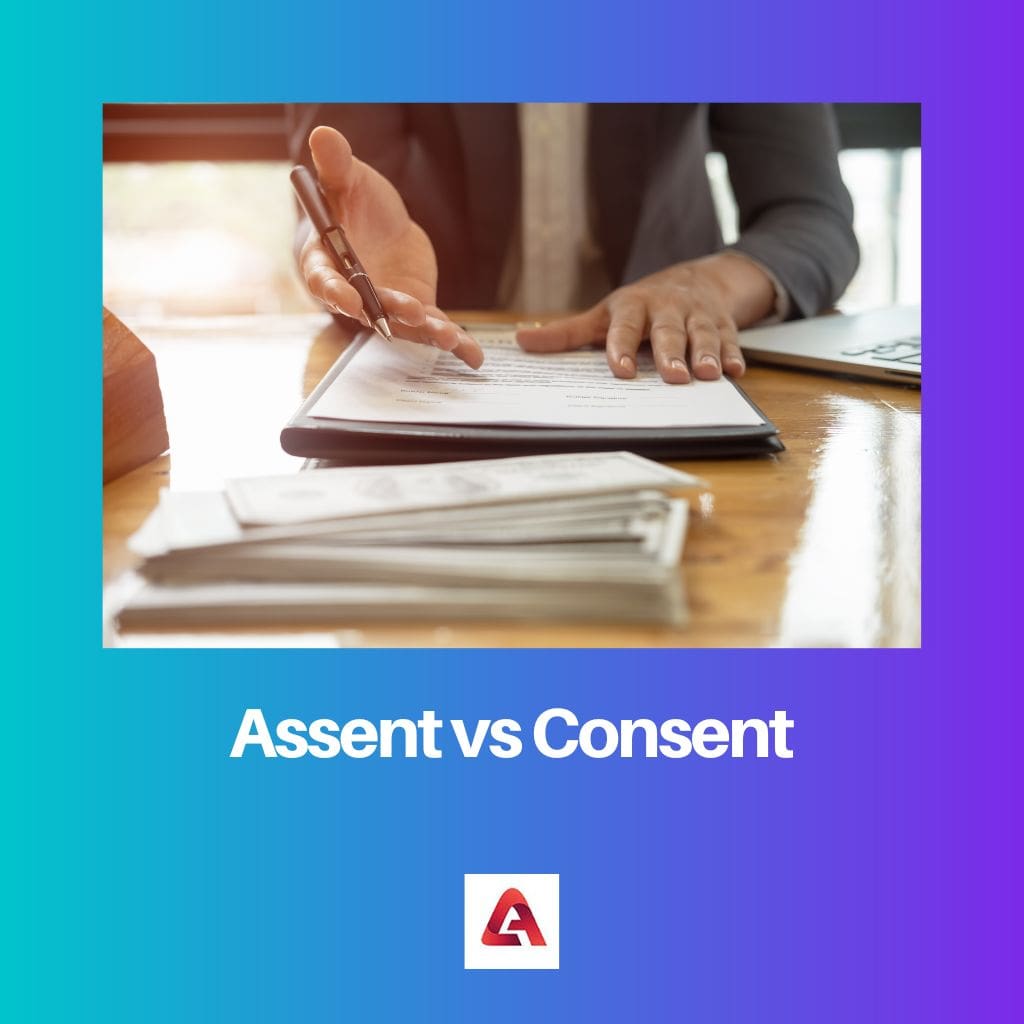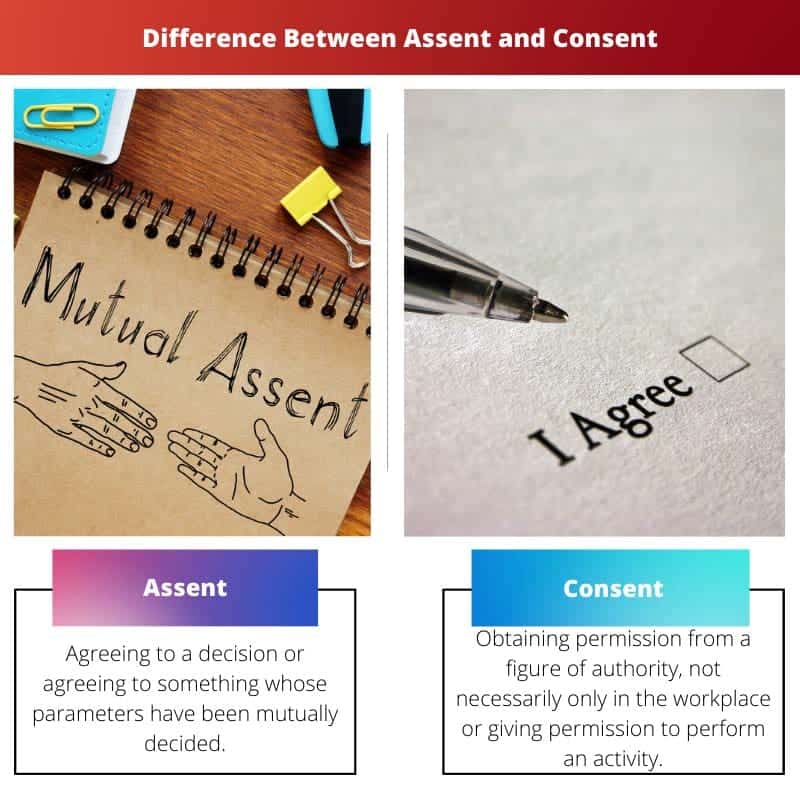Oxford Dictionary defines the word ‘Assent’ as ‘official agreement to or approval of something,’ which essentially denotes any agreement or mutually acceptable decision taken in formal environments such as workplaces. This assent can be anything, varying from approval from the boss, a team selecting a leader, or the execution of a decision under the assent of the concerned person.
Now, when we look up the word ‘Consent’ in the Oxford Dictionary, we see it as ‘permission to do something, especially given by somebody in authority.’ Just off the top of one’s head, we can see that this can easily confuse people due to the presence of the word ‘authority.’
It is, however, important to note here that by ‘authority,’ one does not restrict this action of permitting the workplace only. This can be anywhere, and any authority figure can express consent; however, we use assent when matters are strictly official.
Key Takeaways
- Assent is an expression of agreement or approval, implying a more passive or tacit acceptance; consent involves a voluntary, informed, and active agreement to a proposal or action.
- Consent is crucial in legal and medical contexts, requiring a clear understanding and acceptance of the terms, conditions, or risks involved; assent may carry a different weight or implications.
- In some situations, permission may be a preliminary step before obtaining full consent, particularly when dealing with minors or individuals with limited decision-making capacity.
Assent vs. Consent
Assent refers to the expression of approval with something, by giving a nod, a verbal statement, or a signature on a document. Consent is the act of giving permission for something, while understanding the potential results. It can be communicated verbally, in a paper, or through actions.

Comparison Table
| Parameters of Comparison | Assent | Consent |
|---|---|---|
| Meaning | Agreeing to a decision or agreeing to something whose parameters have been mutually decided. | Obtaining permission from a figure of authority, not necessarily only in the workplace or permitting to perform an activity. |
| Usage | Mostly in the workplace / formal environments. | Used anywhere. |
| Used By | It can be given by a team, or a person in power. People in the workplace / formal environments. | Given by a person in authority. Not necessarily in formal environments only. |
| Nature | Formal | Mostly informal. |
| Morality | Not related to issues of moral concern. | Involves issues of moral concern. |
What is Assent?
Assent is the official agreement to do something. To elaborate, suppose a team meeting is taking place.
In that meeting, there are multiple members, each with their opinions, thoughts, and verdicts. When the team tries to conclude, the initial idea goes through numerous changes and modifications, and finally, a decision is made.
It is then that we say that the decision is made with the assent of the team. Another way assent might be explained is, suppose an employee of a company got an idea of how to tackle a certain problem their company has been facing.
She then presents the idea to her boss, who then reviews it. If the boss considers the solution viable and allows it, then we say that the employee has the assent of the boss in executing this decision.
Another way the word assent might be used is for minors who are not yet of legal age but need to execute a decision, where they use the help of an adult. Assent can be used in sentences in the following ways:
- The team gave assent to execute the project.
- I have the boss’s assent to deploy this program.
- It is by common assent that we will take up this project.
The antonym of assent is dissent. Dissent occurs when someone has an opinion or judgment contrary to the officially accepted judgment or decision.

What is Consent?
Consent is when a person in authority, not necessarily in a formal environment, agrees to do something or agrees to a decision. A team can also give consent, provided the team is in a position to do so.
It is, however, worthwhile to note the use of the word ‘authority’ over here. When we say authority, we imply all kinds of authority, such as authority over intellectual and physical property.
A person is also in a position of authority when asked to participate in any activity. Consent also involves moral binding, which means that in cases where moral issues are involved, such as acts of intimacy, acts that go against the usual belief of a person.
In such cases, when a person agrees to participate in such activities, it is said that they consent to that activity. Sentences where we use consent are:
- My mother has given her consent for me to come to the party tonight.
- You do not have my consent for such atrocious activities.
- All the members gave their consent and elected her as their leader.
The antonym of consent is forbidden when a person in authority does not give permission or orders to stop an activity.

Main Differences Between Assent and Dissent
- The main difference between Assent and Dissent is the place where it is used. Assent is used for more formal work-like environments, while consent is not bound to any specific environment.
- Assent defines the agreement to the execution or implements a mutually agreed-upon decision or a decision that will benefit a company/organization/team. Consent is more individual-focused. However, it is worthwhile to note that consent can involve a team too.
- Issues of moral values are not dealt with by assent. They are dealt with by consent.
- Assent is also used for minors, where an adult acts on their behalf. We can say that the minor has given ‘assent’ for the activity and that the adult has given ‘consent’ to represent the minor.
- In legal aspects, when a person gives an assent, it does not carry any legal significance; however, if consent is given, it carries a legal significance.

- https://www.jstor.org/stable/3564579?seq=1
- https://link.springer.com/article/10.1186/s12910-015-0067-z

The article is very thorough and meticulously laid out. It left no ambiguity about the differences between ‘assent’ and ‘consent’.
Exactly. This information clears up any confusion one might have had about these terms.
Thank you for providing such detailed and accurate information. Very elucidating.
I was not aware of some of these subtle differences between the two – thank you for the excellent explanation!
Yeah, the detailed explanation definitely cleared things up. I appreciate it!
I’ve gained a lot from reading this article. The explanation was top-notch.
The thoroughness of the comparison was impressive. I commend the author.
Absolutely. The clear breakdown made it easy to understand.
I found this article to be very clear and easy to comprehend. Superbly written.
Yes, the comparison was presented in a very clear and informative manner. Great read.
The explanation was extremely enlightening. I am now well-versed in the differences between ‘assent’ and ‘consent’.
Agreed. I thoroughly enjoyed gaining this knowledge.
Definitely. A very insightful read.
This was an excellent explanation. I really appreciate the detailed comparison.
Absolutely agree. The article was extremely elucidating.
This was extremely informative and thorough, and I feel like I’ve got a firm grasp on the differences between ‘assent’ and ‘consent’ now
I agree, the detailed comparison provided here is fantastic. I think I might actually remember this 🙂
The article was very well-written and easy to understand. I’ve learned a lot from it.
Agreed. A very well-written piece.
I concur. This was a very enlightening read.
The author’s explanation was excellent. I feel well-informed about when each term should be used now.
Definitely! I’m satisfied with the information provided here.
Agreed. I think both the article and the comments explain the difference effectively.